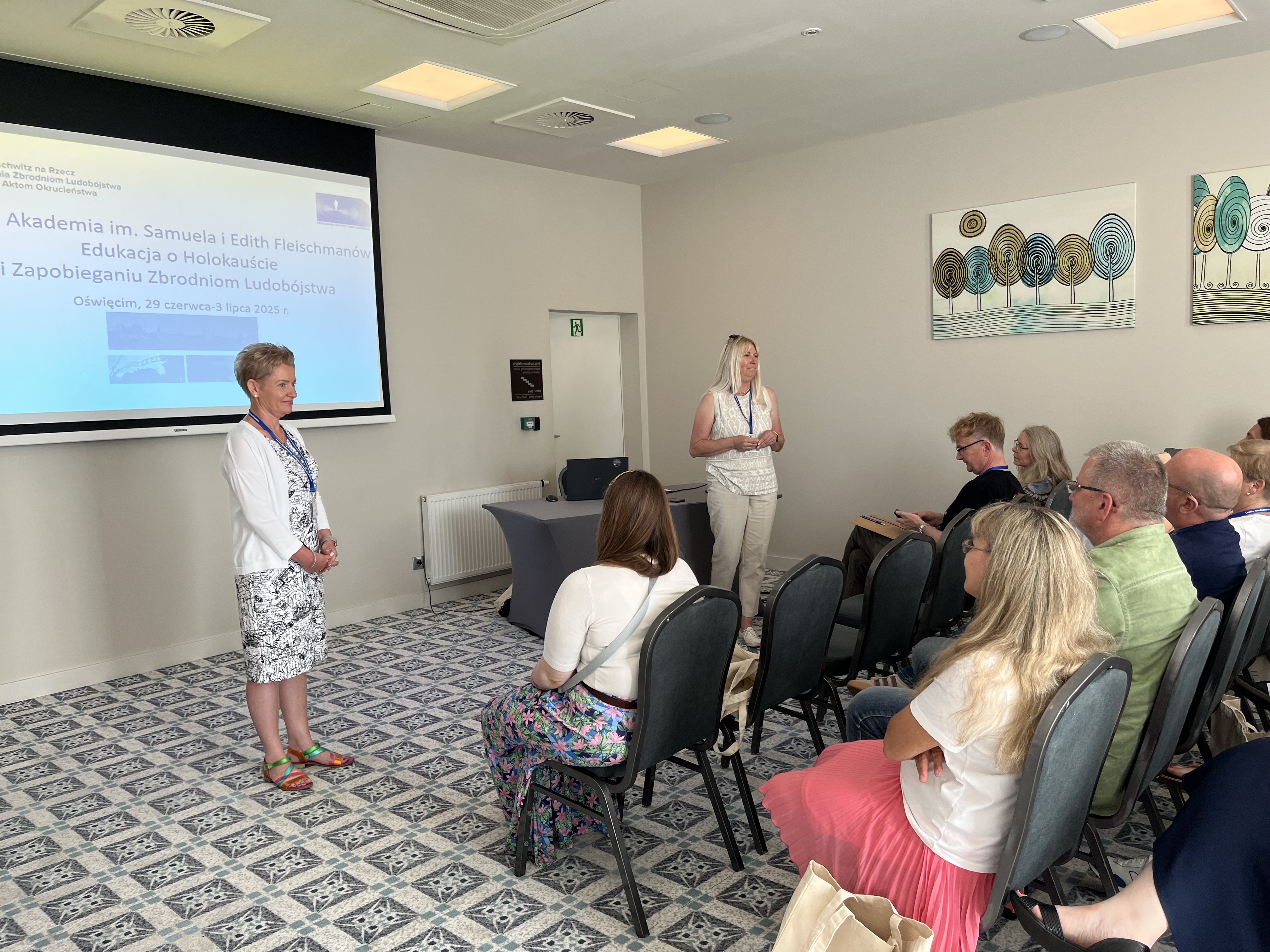To make a secure online donation, please click the button below


From June 29 to July 3, 2025, the Auschwitz Institute for the Prevention of Genocide and Mass Atrocities’ Polish Office held the third edition of the Samuel and Edith Fleischman Summer Academy for Holocaust Education and Genocide Prevention in Oświęcim, Poland. Co-organized by AIPG and the Oświęcim Institute of Human Rights (OIPC), the event brought together 20 teachers and educators from across Poland. The Summer Academy was supported by a team of outstanding lecturers and long-time practitioners in the field of education, fostering in-depth and open discussions about the challenges and opportunities educators face in combating antisemitism, polarization, and xenophobia.
A core component of the program’s educational approach included visits to the Auschwitz-Birkenau State Museum, the Auschwitz Jewish Center, and the Synagogue in Oświęcim. Participants also traveled to the Franciscan Monastery in the village of Harmęże, near Oświęcim, where they had the opportunity to explore Marian Kołodziej’s powerful exhibition, The Labyrinth.
The 2025 edition of the Samuel and Edith Fleischman Summer Academy for Holocaust Education and Genocide Prevention was made possible through the generous support of Edward Fleischman and his family. This year, he personally traveled from the United States to meet with the participants. He shared the following words:
“The Summer Academy was created to honor the memory of my parents, Samuel and Edith Fleischman, both Holocaust survivors. My mother, Edith Jacobowitz, was born in Łódź, Poland — just 240 km from Auschwitz. She survived the Łódź Ghetto and was later deported to Auschwitz. She lost her entire family. After the war, she emigrated to New York to begin a new life.
My father, Samuel Fleischman, was born in Galicia. He was imprisoned in a French internment camp near Paris, from which he escaped (...). During the war, he lost his first wife and daughter.
My parents’ stories are a part of my life, but they are also a call to action, because today we are once again witnessing warning signs of hatred gaining strength.”
Del 29 de junio al 3 de julio de 2025, la Oficina de Polonia del Instituto Auschwitz para la Prevención del Genocidio y Atrocidades Masivas (AIPG, por sus siglas en inglés) celebró la tercera edición de la Academia de Verano Samuel y Edith Fleischman sobre Educación sobre el Holocausto y Prevención del Genocidio en Oświęcim, Polonia. Coorganizado por AIPG y el Instituto de Derechos Humanos de Oświęcim (OIPC), el evento reunió a 20 docentes y educadorxs de todo el país. La Academia de Verano contó con el respaldo de un equipo de destacados conferencistas y profesionales con amplia trayectoria en el ámbito educativo, lo que permitió generar debates profundos y abiertos sobre los desafíos y oportunidades que enfrentan lxs educadores en la lucha contra el antisemitismo, la polarización y la xenofobia.
Un componente central del enfoque educativo del programa incluyó visitas al Museo Estatal de Auschwitz-Birkenau, el Centro Judío de Auschwitz y la sinagoga de Oświęcim. Lxs participantes también viajaron al Monasterio Franciscano en la localidad de Harmęże, cerca de Oświęcim, donde tuvieron la oportunidad de recorrer la impactante exposición de Marian Kołodziej, El Laberinto.
La edición 2025 de la Academia de Verano Samuel y Edith Fleischman sobre Educación sobre el Holocausto y Prevención del Genocidio fue posible gracias al generoso apoyo de Edward Fleischman y su familia. Este año, él viajó personalmente desde Estados Unidos para encontrarse con lxs participantes, y compartió las siguientes palabras:
“La Academia de Verano fue creada para honrar la memoria de mis padres, Samuel y Edith Fleischman, ambos sobrevivientes del Holocausto. Mi madre, Edith Jacobowitz, nació en Łódź, Polonia —a solo 240 km de Auschwitz. Sobrevivió al gueto de Łódź y luego fue deportada a Auschwitz. Perdió a toda su familia. Después de la guerra, emigró a Nueva York para comenzar una nueva vida.
Mi padre, Samuel Fleischman, nació en Galitzia. Estuvo prisionero en un campo de internamiento francés cerca de París, del cual logró escapar (...). Durante la guerra, perdió a su primera esposa y a su hija.
Las historias de mis padres forman parte de mi vida, pero también son un llamado a la acción, porque hoy, una vez más, estamos presenciando señales de advertencia del fortalecimiento del odio.”